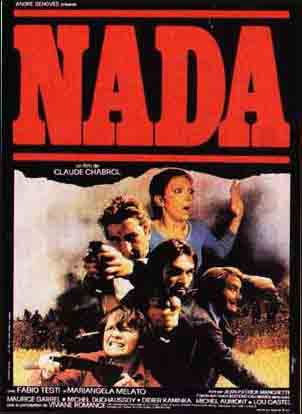
NADA
France/Italy, 1974, 109 minutes, Colour.
Fabio Testi, Michel Duchaussoy, Maurice Garrel, Michel Aumont, Lou Castel.
Directed by Claude Chabrol.
Nada is a political thriller from Claude Chabrol. Director Chabrol's admirers have come to expect him to explore conscience, guilt and punishment. This is usually in the context of murder. In Nada (a nihilistic name for a French terrorist gang), he moves to the guilt and conscience of anarchists and of established society. While both are found wanting, the anarchists do have a cause which they pursue relentlessly. Government is merely cynical, dominant and self-protective. Which makes the film coolly and efficiently made (it is not an emotional plea), a grim story, an observation on the moral climate of western society at the present time.
1. The tone and significance of the title? In terms of the gang, in terms of their beliefs, in terms of their achievement?
2. The importance of the film's structure: the recruiting, the plan, its execution, the difficulties, the holding of the ambassador intercut with the investigation, the culminating siege, the violent climax, the revelation to the press? Comment on the dramatic momentum, audience involvement, sympathies and repulsion? How skilfully manoeuvred were audience feelings?
3. How much of the film's value depended on political sympathies and antipathies? Attitudes towards right and left? French and European politics,, terrorism? American politics and domination?
4. How particularly French was the film? In subject, tone, background and themes. treatment? The contrast with America and its style, beliefs?
5. How did the film reflect the politics and violence of the 60s and 70s? The political atmosphere, right and left. anarchy and revolution? Government and its suppressive powers? Terrorism and the freedom of the press etc?
6. Comment on the contribution of the colour city and country locations, atmosphere, film editing. musical commentary.
7. Audience response to the gang and their personalities and political involvement? Their motivation? Comment on each individually and as a collective group: Diaz, Epaulard, D'Arcy, Treuffais, Veronique Cash?
8. How well did the film present and develop the personalities of each of the gang? Their personal beliefs, style. self assertion? Violence, love and hate?
9. The details of the recruiting. the atmosphere of the opening and recruiting Epaulard. Diaz arriving to kill him and then combining with him? Treuffais' classes and his personality, anger in the crowds. later quiet under torture? The details of the plan. its almost successful execution? The violence, especially in the death of the police? The irony that it was all being filmed?
10. The personality of the American ambassador, what he stood for. the fact that they planned to capture him in a brothel. the details of his behaviour there, the sudden shock of his being taken, the plans of his kidnapping and his being in the car, in the house?
11. Comment on the film's presentation of government attitudes towards the crisis, the minister at home and coming to Paris and being on the job? His pressure on his secretary? The pressure on the police? Their responsibility and way of coping?
12. The central importance of Goemond? His being pictured as submissive to his superiors, his pressure on his inferiors? His devious mind? The rivalry with the other department and the fact that they filmed the kidnap? Goemond's techniques. his torture, his good detective work?
13. Comment on the suspense given in the presentation of clues for the police. their searching. the attempted suicide of Anna? The torture of Treuffais?
14. The atmosphere in the farmhouse, Veronica and her affair with Epaulard? The tension in the house, the drinking, the pressure with the ambassador and looking after him? The sudden awareness on the gang of what they had done? Radio reports and their response? Their going into the town for supplies? The ordinariness and the extraordinariness?
15. The violence of the siege, the full scale commando attack, the massacre and killing people even with white flags? The basis for this decision? The ambiguities of the minister's message, his secretary's message, Goemond's interpretation? Goemond's own particular atrocities?
16. The impact of the political aftermath? The importance of Diaz' escape? The significance and detail of his commentary on the tape recorder? The anarchical S nihilistic approach?
17. How appropriate the climax in his plan for confronting Goemond? The melodramatic entry, the mutual shooting and its violence? The irony after Goemond's dismissal by authority, his exile to Africa, the vindictiveness in his interview with the press, his hoping for vindictive success? The irony then that Treuffais would tell the truth to the newspapers?
18. Was the film just and fair in its presentation of the anarchists, the Americans, the government? How did it make audiences reflect on their political principles? Is this kind of suspense and action drama a good way of arousing political interest and judgement?